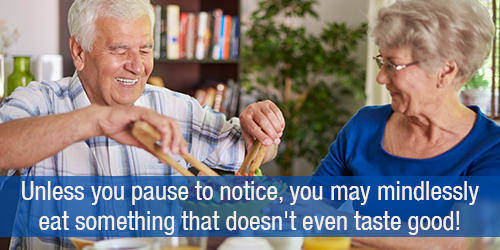By Megrette Fletcher, M.Ed, RD, CDCES
Mindful eating has captured the attention of people with diabetes who crave an alternative to conventional restrictive approaches to diabetes management. Some people think mindful eating just means slowing down, chewing your food, and savoring each bite. Others think mindful eating is paying more attention to what, when, or how much you eat. Am I Hungry? Mindful Eating for Diabetes helps you because it includes all of this and much more. This post will answer your question: What is mindful eating and how can it help my diabetes?
The power of the present moment
When mindfulness, which I’ll define as choosing to be aware of your current experience, is combined with eating, there’s a major shift in the way you think about food. Instead of focusing on what you can’t eat or what you should have eaten instead, pause and observe what is present in you.
“Huh? All I have to do is just pay more attention? That sounds too simple!” Actually, this small step can be quite challenging because paying attention is a skill. Learning any new skill requires practice; the more you practice, the better you become at it.
Many people eat on autopilot, without awareness of their experience. Awareness of the present moment allows you to choose your actions, rather than repeating past actions out of habit.
Bring enjoyment back to eating, even with diabetes!
Unfortunately many people with diabetes have been taught to eat less, count carbohydrates, and feel guilty when their blood sugars are high. Having someone ask you to think about the bite in your mouth and decide if the food you’re eating tastes good may seem irrelevant compared to paying attention to whether you’re eating “right.”
 “Wait a second. You want me to taste my food now?” Exactly! Mindful eating is becoming aware of information that is available only to you.
“Wait a second. You want me to taste my food now?” Exactly! Mindful eating is becoming aware of information that is available only to you.
My clients are surprised when I ask them to try to notice the flavors of the food they’re eating. People often think they love a particular food, but there are many reasons why that same food doesn’t always taste as good. For example, maybe you feel rushed, not hungry (or not hungry anymore), excited by the conversation, or something as simple as having recently brushed your teeth. Sometimes the way the food was prepared isn’t appealing to you.
Unless you take a moment to notice, you may mindlessly eat something that doesn’t even taste good!
Try mindful eating to see how it helps
- For the next several snacks or meals, take a bite then pause for a moment and notice how the food really tastes. Why? Because there is no test, instrument, or machine that can measure how a food tastes to you. The only way to know if something tastes good to you is to taste it and notice.
- Rate the bite on a scale of 1 (not very good) to 10 (wonderful). Continue rating each bite.
- Become curious! Ask yourself lots of questions. What do you enjoy about that bite? Is it delicious because it’s warm and chewy? Refreshing because it’s cold and crisp? What tastes–sweet, sour, salty, bitter, or umami–am I getting from this food? Can I identify any specific ingredients? Do I have any memories associated with these flavors?
- Eating mindfully helps you notice your enjoyment of food changing as you eat. Something that tastes good at first may lose its appeal after a few bites. Noticing this shift can help you place your fork down, recognizing you aren’t stopping because you have to, but because you want to when the food no longer tastes wonderful.
Tasting your food is just one piece of the puzzle, but enjoying your food is an important part of mindful eating with diabetes!
This article was updated from a previous version.
Enjoyed this article? Here are three more to help you:
Can you eat snacks and desserts with diabetes?
Deprivation: A Hidden Trigger for Eating


